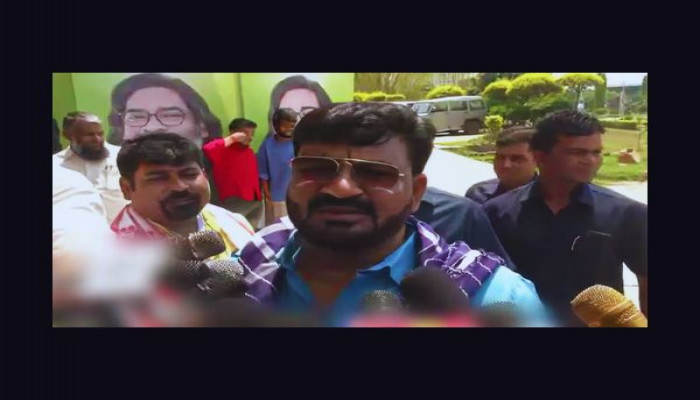Jharkhand minister sparks controversy over Shariat-first remark, later clarifies position
- In Reports
- 07:33 PM, Apr 14, 2025
- Myind Staff
Jharkhand’s Minority Welfare Minister and Jharkhand Mukti Morcha (JMM) leader, Hafizul Hasan, found himself at the centre of a political storm after stating that, for Muslims, Shariat holds priority over the Indian Constitution. The comment, which quickly circulated online and drew sharp political criticism, was later followed by a clarification in which Hasan said that both the Shariat and the Constitution are equally important.
The initial remark was made during a media interaction in Ranchi, where Hasan said, “Shariat hamare liye bada hai. Hum Quran seene mein rakhte hain aur haath me samvidhaan. Islam mein Shariat ko pehle pakdenge fir samvidhaan ko” (Shariat is greater for us. We keep the Quran in our hearts and the Constitution in our hands. In Islam, Shariat comes first, then the Constitution). The video of the statement was shared by the Jharkhand BJP, amplifying the backlash.
What is Shariat?
Shariat, or Sharia, refers to Islamic law that guides the moral and ethical conduct of Muslims. The term means "path" or "way" in Arabic and is considered a reflection of divine will in many Muslim-majority countries. In India, while personal laws for different religious communities are legally recognised, the Constitution remains the supreme law of the land.
Minister Issues Clarification Amid Outrage
In response to the growing controversy, Minister Hasan sought to clarify his remarks. Speaking to reporters on Monday, he said, “I had said that Shariat mere seene mein hai, par Babasaheb ka samvidhaan haath mein hai” (Shariat is in my heart, but Babasaheb’s Constitution is in my hands). He emphasised that both the Constitution and Shariat hold equal importance, and referred to Dr. B.R. Ambedkar, the architect of the Constitution, noting his role in empowering backward communities through reservation policies.
“You have seen statues of Babasaheb holding the Constitution in his hand. We come from financially backward communities. He gave reservations to us, and that’s why we have been ahead,” said Hasan, speaking ahead of the 13th National Conclave of the JMM in Ranchi.
Political Reactions Intensify
The statement drew immediate and sharp criticism from opposition parties, particularly the Bharatiya Janata Party (BJP) and its ally, the Nishad Party. The Jharkhand BJP responded on social media platform X (formerly Twitter), stating: “For those who have Shariat in their hearts, the doors of Pakistan and Bangladesh are open. India will run only on the Constitution of Babasaheb Dr Bhimrao Ambedkar and will remain supreme.”
Sanjay Nishad, a minister in Uttar Pradesh and the leader of the Nishad Party, echoed similar sentiments. He declared that individuals who prioritise Shariat over the Constitution should relocate to Pakistan, a country he described as established for followers of Shariat.
“Shariyat people made a place of their own in the name of Allah, whose name is Pakistan. Such people should go there. Those who had to follow Shariat should go to Pakistan. Visas will be made for them to go there,” said Nishad.
He further added, “Those who changed the law in one hour have gone to Pakistan. They are crying, dying without food and treatment.” Nishad also asserted that the Indian government has provided essential services, including food grains and employment, to Muslims in India.
While Hafizul Hasan’s initial remarks sparked a political uproar, his later clarification appeared to be an effort to calm the storm by reaffirming his commitment to the Indian Constitution. However, the statement reignited ongoing debates around the role of religious laws in a secular democracy and highlighted the politically sensitive nature of such discourse. As political leaders continue to weigh in, the incident underscores the fine balance between religious identity and constitutional allegiance in a pluralistic nation like India.







Comments